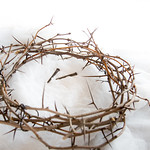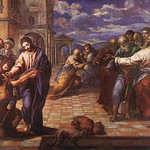Our Readings for today are concerned about our perception, how we see things and our inability to see things as they are. Most importantly, how we can see with the eyes of faith and understand with our hearts. “God does not see as man sees; man looks at appearances, but the Lord looks at the heart” is one of the lessons from our first Reading. Samuel in our first reading saw things from the perspective of the flesh and not from God’s perspective. We all suffer from certain forms of blindness, and we all need healing from the Lord. It is important to note that right at the beginning of the Gospel, Jesus answers the question of whether sickness, suffering and other unfortunate events in life should be seen as punishment for sinful behavior. Neither he nor his parents sinned”, Jesus answered,“ he was born blind so that the works of God might be displayed in him. The disciples were conscious that sin can have devastating consequences on the sinner and others. Jews at the time of Jesus were very much aware of this – the consciousness of sin.
There are pain and suffering in this world and these are the by-products of the fall (Romans 5:12; 1 Corinthians 15:21). Even though the Almighty continues to sustain this created world, it must never be lost on us that we live in a corrupt, broken, and imperfect world. For these and many other reasons we go through suffering, pain, and dark moments in our lives. Admittedly, it must be emphasized that a lot of what we go through as individuals are as a result of sinful and wrong choices we make in life. Are we still conscious of our sinfulness and the consequences of sin? Whoever does not accept his or her sinfulness cannot become a true Catholic.
A Knights Obedience
The first step at every Eucharistic celebration is to be reminded of our sins, our failings, and the need to ask God for forgiveness. Becoming aware of who we are, is central to our relationship with the Lord and that is why we have the wonderful sacrament of Reconciliation. In the 21st century, sin has become so funny to the extent that the modern man does not take it serious anymore. We no longer see sin as a threat to our relationship with the Lord but as something we can comfortably laugh it off. Sin may be fun for a moment, but it always has consequences. The disciples of Jesus were aware of this and that is why they asked, “Rabbi, who sinned, this man or his parents, for him to have been born blind?”
We live in a world where many things are undergoing redefinition. Marriage, freedom, virtues, rights, and family values are being redefined to suit compromised opinions. The nature of sin is being redefined to make it more “appropriate” and “acceptable” so that people can sin without any guilt feelings. This is the world in which we live. In the name of freedom, tolerance, modernism and social acceptance, our generation is normalizing absurdities, giving meaning to idiotism, and glorifying what is sacrilegious. The absence of the sense of sin has become one of the destructive forces in the church. And, once we lose the sense of sin in the world, we will become blind to sin, and everything will be normalized in the community of believers. St. Paul in the second reading admonishes us “For you were darkness once, but now you are light in the Lord. Be like children of light, for the effects of the light are seen in complete goodness, and right living and truth.” Our calling as disciples of the Lord places a lot of responsibility on us. We can therefore not become blind to our duty to live as sons and daughters of light.
The disciples wanted to know who was to be blamed for the blind man’s predicaments. Jesus’ response to the question of the disciples was very instructive, “Neither he nor his parents sinned.” Human beings will always want to blame others for their troubles. It started from our first parents. Adam blamed Eve and Eve in turn blamed the serpent. Unfortunately, the serpent was not allowed to speak before God pronounced his sentence. Are we accountable enough and do we accept responsibility for our failings, our actions, and inaction? Do we always look for vulnerable scapegoats when things go wrong? Is this not another form of spiritual blindness?
For how long are we going to blame others for the things that we do? We are indeed responsible for our actions – all of them. We are responsible for our thoughts and behavior, whether deliberate or unintentional. A responsible person makes mistakes, but when they do, they take responsibility and make it right.
Lent is a season of making things right. The church gives us forty days of grace to right our wrongs and to make things better. The disciples of Jesus saw a beggar who has been born blind. Jesus on the other hand saw a child of God who needed healing and restoration. He saw a man in need of dignity, a man through whom God’s glory could be magnified. The disciples were blind to the deepest aspirations of the man. We are also beggars who are constantly in need of God’s mercy, God’s love, God’s grace, and God’s sustained protection. The season of Lent is a special period for us to become more conscious of our spiritual needs, as well as the needs of our fellow human beings.
Fast so that others do not go hungry.
Give alms so that the needs of others could be met.
Pray so that we can all become better versions of ourselves.
What do we normally see in others? Do we recognize their needs, and when we do, do we attend to them? On the other hand, are we quick to judge and condemn them? May the Lord open our eyes and hearts to recognize our own needs and the needs of our fellow human beings.



Recent Comments